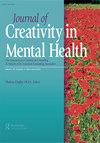创新心态在孝道与心理调适关系中的中介作用
IF 0.8
Q4 PSYCHOLOGY, CLINICAL
引用次数: 0
摘要
本文章由计算机程序翻译,如有差异,请以英文原文为准。
Mediating Role of Creative Mindsets in the Relation between Filial Piety and Psychological Adjustment
ABSTRACT We examined the mediating role of creative mind-sets in the relationship between filial piety beliefs and children’s psychological adjustment in the context of Chinese culture. In the current study, we adopt structural equation modeling to address this gap. A total of 657 Taiwanese young adults (M age = 16.86 years) were recruited in a survey for the study. The analysis yielded the following results. First, reciprocal filial piety (RFP) belief was linked to a malleable creative mind-set, whereas authoritarian filial piety (AFP) belief was positively associated with a fixed creative mind-set. Second, endorsement of a malleable creative mind-set had nonsignificant associations with any dimension of psychological adjustment, while a fixed creative mind-set contributed negatively to life satisfaction and positively to psychological distress. Third, a fixed creative mind-set, but not a malleable mind-set, mediated the relationship between filial piety beliefs and psychological distress involving social dysfunction and anxiety/depression.
求助全文
通过发布文献求助,成功后即可免费获取论文全文。
去求助
来源期刊

Journal of Creativity in Mental Health
PSYCHOLOGY, CLINICAL-
CiteScore
1.70
自引率
16.70%
发文量
18
期刊介绍:
The Journal of Creativity in Mental Health, the official journal of the Association for Creativity in Counseling, a division of the American Counseling Association, is the valuable interdisciplinary reference source for academics and therapeutic practitioners. This refereed journal examines the practical applications of using creativity to help deepen self-awareness and build healthy relationships. This journal also explores how creative, diverse, and relational therapeutic approaches can be used in counseling practice. Each issue of the Journal of Creativity in Mental Health provides a wide range of interdisciplinary discussion relative to diverse mental health issues.
 求助内容:
求助内容: 应助结果提醒方式:
应助结果提醒方式:


